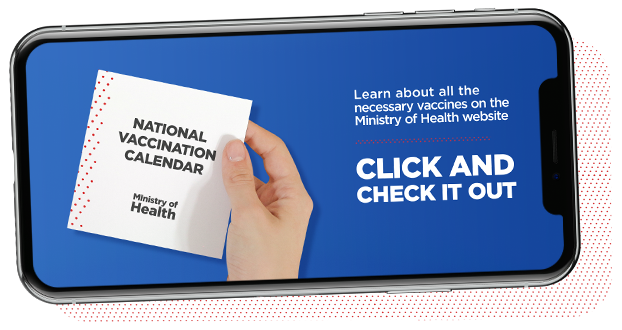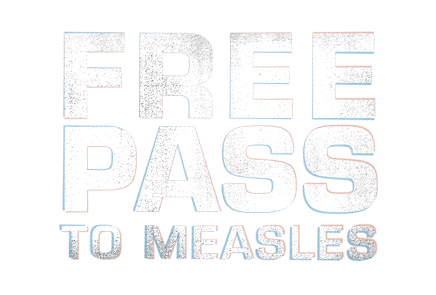
Where is your vaccination card?
When was your last vaccination?
Is there any disease outbreak out there?
SAVE IT IN YOUR MEMORY OR THE VIRUSES CAN INFECT YOUR NEGLECT
Forgetting important things, such as vaccination, can be worse than you think. After all, as time goes by, viruses and other microorganisms may go through mutations and become stronger – such as influenza, measles, tuberculosis, among others.
It’s not for nothing that the WHO (World Health Organization) establishes a vaccination calendar.

There is no vaccination against neglect
The vaccination card is an essential document to help monitor your healthcare along your lifetime. But many people prefer to leave it aside and, consequently, vaccines end up being forgotten.
Check out the main risks you and your family are taking without immunization:

MEASLES
Once considered eradicated, in 2018 this disease recorded outbreaks in Brazil again: there were over 10 thousand cases all over the country¹. To make matters worse, every “distracted” person can infect up to 10 other people.
TRANSMISSION: It can be spread through coughing and sneezing.
MAIN RISKS: It is highly contagious and it has a high infant mortality rate.
SYMPTOMS: Symptoms appear between 10 and 14 days after exposure to the virus and include runny nose, cough, inflamed eyes, skin rash and high fever. Three to five days after the symptoms begin, the skin rashes break out, mainly as flat, red spots that appear on the face and hair line, and then spread to the neck, upper body, arms, legs and feet.
VACCINATION: Children from 1 to 12 months old: one dose of the Triple Viral or MMR Vaccine (against measles, mumps and rubella);
At 15 months old: one dose of the Tetra Viral or MMRV Vaccine (against measles, mumps, rubella and varicella);
Unvaccinated children up to the age of 5: 2 doses of the Triple Viral;
From 10 to 19 years old: 2 doses, depending on the previous vaccination situation;
From 20 to 29 years old, if never vaccinated: 2 doses;
From 30 to 49 years old: 1 dose.
INFLUENZA
The Influenza A virus, also known as cold, swine influenza or Spanish influenza, and its subtype H1N1, represent the greatest risks. In 2009, there was a worldwide pandemic with cases of swine influenza. In 2018, in Brazil, 18.478 cases.² were reported.
TRANSMISSION: Through the cough or sneeze of infected people, besides contact with contaminated objects.
PRINCIPAIS MAIN RISKS: Children living in indoor environments and babies who do not breastfeed are the most prone to be infected.
SYMPTOMS:³ Fever over 38°C (100.4°F), aching muscles, sore throat, prostration, headache and dry cough. In addition, sudden signs such as chills, discomfort, sore throat, diarrhea, vomiting, red and teary eyes.
VACCINATION: Trivalent, offered periodically, always before winter in Brazil.

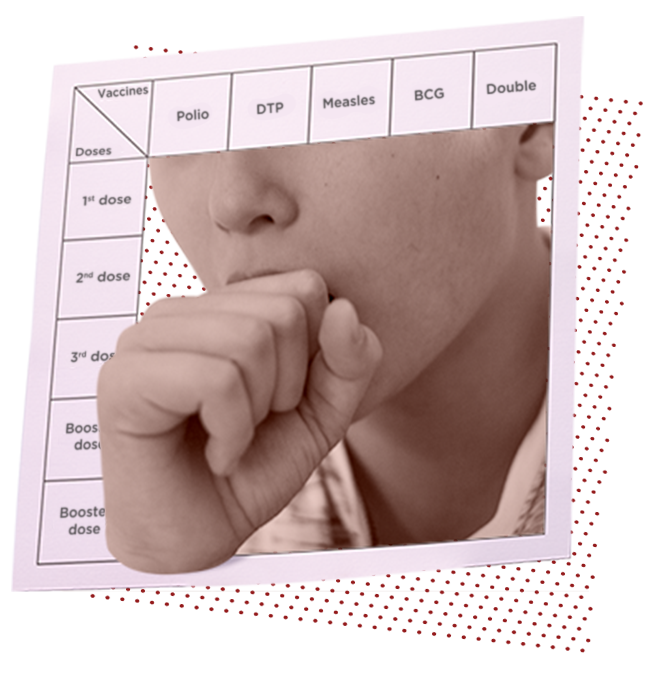
TUBERCULOSIS
It is highly contagious. In 2018, 72.8 thousand cases were reported in Brazil?, with over 4 thousand deaths. Men between the ages of 25 and 40 are within the most affected group.
TRANSMISSION: Direct transmission through cough or saliva (speaking, kissing, etc.)
MAIN RISKS: A single person suffering from tuberculosis can infect up to 15 people.
SYMPTOMS: Dry cough, secretion for over 3 weeks, evolving to cough with pus or blood, excessive fatigue, low fever mostly during the afternoon, night sweats, lack of appetite, severe weight loss and hoarseness.
VACCINATION:The BCG (Bacillus Calmette–Guérin) vaccine is mandatory for children under the age of 1, but may be administered to children up to 4 years and 11 months old.
POLIOMYELITIS
According to data of the Ministry of Health?, 312 Brazilian municipalities have a vaccination coverage below 50%, something very far from the 95% of the necessary coverage. Children under 5 years old are within the main risk group.
TRANSMISSION: Orally and through the contact with contaminated water or food.
MAIN RISKS: It attacks the muscle nerves within a short time. It may cause paralysis and even death.
SYMPTOMS: Fever, fatigue, vomiting, headache, stiff neck and sore arms or legs.
VACCINATION: Administered in two doses – IPV (Inactivated Polio Vaccine) for children 2, 4 and 6 months old, with booster dose between 15 and 18 months old, and between 4 and 5 years old; OPV (Oral Polio Vaccine) administered at 15 months old and at 4 years old.
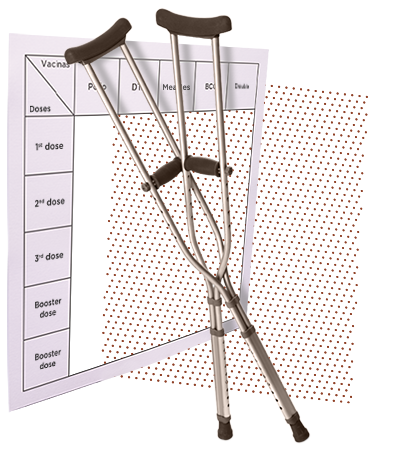
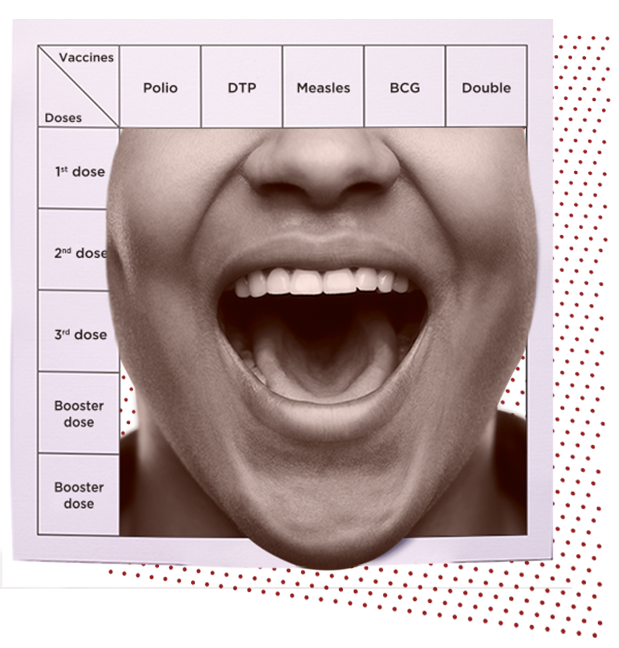
DIPHTHERIA
Also known as croup, it is caused by bacteria housed in the tonsils, larynx, pharynx and nose, causing breathing difficulties and even death. According to the Ministry of Health, the vaccination coverage has been reducing in recent years?, what might be dangerous due to the migration of the population coming from countries where the disease was not eradicated.
TRANSMISSION: Contact with saliva droplets expelled in coughing or sneezing, as well as contact with skin lesions in infected people.
MAIN RISKS: Breathing difficulty or total blockage of breathing.
SYMPTOMS: Reddish skin spots, discomfort, white patches on the tonsils or even neck swelling, making it difficult to breathe.
VACCINATION: Pentavalent vaccine (preventing diphtheria, tetanus, pertussis (whooping cough), hepatitis B and HiB – Haemophilus influenzae type B), at 2, 4 and 6 months old, with a booster dose of DTP (diphtheria, tetanus and pertussis) at 15 months old, and another booster dose at 4 years old.
As it doesn’t provide a permanent immunization, the Double Adult DT (prevents diphtheria and tetanus) is necessary from 10 to 19 years, 11 months and 29 days old, with a booster dose every 10 years.
DOSES OF INFORMATION:
VACCINATION FOR PREGNANT WOMEN
The Ministry of Health, through the National Immunization Program?, offers four types of vaccines for pregnant women: dTpa (diphtheria, tetanus and whooping cough); dT (diphtheria and tetanus); hepatitis B and against influenza.
BUILD ANTIBODIES AGAINST BAD LUCK
It’s impossible not to live around other people. So it is better to prevent yourself against viruses that circulate everywhere. Protect yourself and your family with all the necessary vaccination. Stamp your passport and close the gates to the infecto-contagious diseases.



